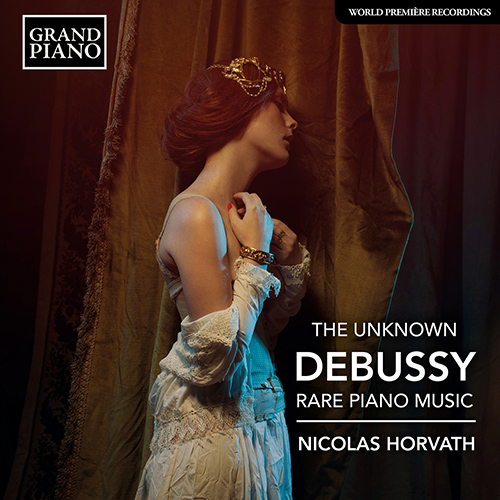
About this Release
“This album is the culmination of more than half a decade of work together with Robert Orledge, and is also the fruition of Robert's own hard work. Exceptional in every way, the recording includes unknown music by Debussy, works that he barely finished and/or were lost; it took years for Robert to find and reconstruct them. Displaying an incredible range of feeling – passion, intense joy, transcendance, despair, horror and humour – it is difficult to single out any single piece as my favourite since I honestly love them all! The booklet includes some wonderful images related to the music in the album, as well as articles by four personalities – composer Régis Campo; musicologist David Christoffel; clinial psychologist Marie-Lise Babonneau; and philosopher Yannis Constantinides – who share their own views about the act of creation, and the act of completing what was left unfinished. This project is one of the highlights of my career as an artist, and surely one of my biggest prides thus far!” — Nicolas Horvath
THE UNKNOWN DEBUSSY
Rare Piano Music
- Nicolas Horvath, piano
Robert Orledge’s research into Debussy’s sketches and incomplete drafts has resulted in the unearthing and reconstruction of numerous lost masterpieces, the piano versions of which are given their première recordings here. Unknown versions of famous pieces such as La Fille aux cheveux de lin and an unused movement from Le Martyre de Saint Sébastien appear alongside the ecstatic Prélude de l’Histoire de Tristan. This uniquely valuable programme also includes the life-affirming suite for No-ja-li (Le Palais du Silence) with narration.
This recording was made on a period instrument: Steinway, Model C No. 248200 (1925)
Tracklist
|
1
L'enfant prodigue: Prélude (version for piano) (1884) * (00:02:46)
|
|
2
Rodrigue et Chimène: Prélude (version for piano with concert ending, ed. R. Orledge) (1893) * (00:04:58)
|
|
3
Préludes, Book 1: No. 8. La fille aux cheveux de lin (1907 first version of opening fragment in B-Flat Major) (1910) * (00:00:46)
|
|
4
Prélude à l'histoire de Tristan (version for piano, completed R. Orledge, 2011) () * (00:04:26)
|
|
5
Préludes, Book 2: No. 5. Bruyères (1912 first version) (1913) * (00:03:47)
|
|
6
Toomai des éléphants (reconstructed by R. Orledge, 2006) (new edition) (1913) * (00:06:33)
|
|
7
Petite valse (completed R. Orledge, 2006) (1915) (00:02:07)
|
|
8
Fêtes Galantes, Tableau 1: Les Masques (commencement) (completed R. Orledge for piano, 2006) (1913) * (00:07:08)
|
|
9
Le martyre de St. Sébastien, Act III: Le concile des faux dieux: La passion (unused first draft, completed R. Orledge for piano, 2014) (1911) * (00:04:28)
|
|
10
No-Ja-Li (Le Palais du Silence) (completed R. Orledge for narrator and piano, 2005/2014) () * (00:17:17)
|
|
Le Roi Léar (completed R. Orledge for piano, 2004/2018) () (00:08:00 )
|
|
11
Prélude * (00:03:52)
|
|
12
[autre] Fanfare * (00:00:58)
|
|
13
Le Sommeil de Léar * (00:03:36)
|
|
14
La Mort de Cordélia * (00:03:36)
|
|
15
Un jour affreux avec le Diable dans le Beffroi (arr. R. Orledge for narrator and piano) () * (00:11:37)
|
|
16
La Chute de la Maison Usher (completed R. Orledge for piano, 2010, cadanza by N. Horvath) () * (00:06:30)
|
The Artist(s)
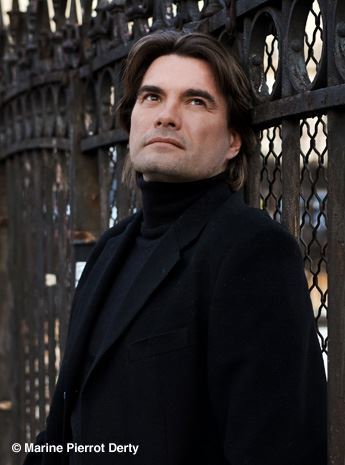 Nicolas Horvath began his music studies at Monaco’s Académie de Musique et de Théâtre Prince Rainier III and soon began to make an impression on a number of artists who would become his mentors. Aged 16 he caught the attention of the American conductor Lawrence Foster before coming to the notice of several distinguished international pianists, including Liszt specialist Leslie Howard. He is the recipient of numerous awards, including First Prize at both the Scriabin and the Luigi Nono International Competitions. He has become noted for hosting concerts of unusual length, sometimes lasting over twelve hours, such as the overnight performance of the complete piano music of Erik Satie at the Paris Philharmonie before a cumulative audience of 14,000 people. In 2019 he performed alongside Philip Glass at the same venue in a programme devoted to the American composer’s piano music. Horvath’s extensive and varied discography on Grand Piano includes the highly acclaimed Philip Glass solo piano music edition, Glassworlds; the complete piano works of Erik Satie; piano sonatas by the Estonian composer Jaan Rääts and music by the American experimental composer Alvin Lucier; Carl Czerny’s 30 Études; and lesser-known piano music by Claude Debussey, Anne-Louise Brillion de Jouy and Hélène de Montgeroult. Nicolas is a Steinway Artist.
Nicolas Horvath began his music studies at Monaco’s Académie de Musique et de Théâtre Prince Rainier III and soon began to make an impression on a number of artists who would become his mentors. Aged 16 he caught the attention of the American conductor Lawrence Foster before coming to the notice of several distinguished international pianists, including Liszt specialist Leslie Howard. He is the recipient of numerous awards, including First Prize at both the Scriabin and the Luigi Nono International Competitions. He has become noted for hosting concerts of unusual length, sometimes lasting over twelve hours, such as the overnight performance of the complete piano music of Erik Satie at the Paris Philharmonie before a cumulative audience of 14,000 people. In 2019 he performed alongside Philip Glass at the same venue in a programme devoted to the American composer’s piano music. Horvath’s extensive and varied discography on Grand Piano includes the highly acclaimed Philip Glass solo piano music edition, Glassworlds; the complete piano works of Erik Satie; piano sonatas by the Estonian composer Jaan Rääts and music by the American experimental composer Alvin Lucier; Carl Czerny’s 30 Études; and lesser-known piano music by Claude Debussey, Anne-Louise Brillion de Jouy and Hélène de Montgeroult. Nicolas is a Steinway Artist. The Composer(s)
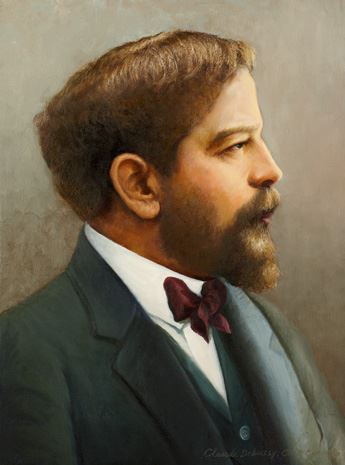 Claude Debussy has exercised widespread influence over later generations of composers, both in his native France and elsewhere. He was trained at the Paris Conservatoire, and decided there on a career as a composer rather than as a pianist (his original intention). His highly characteristic musical language, thoroughly French in inspiration, extended the contemporary limits of harmony and form, and he had a remarkably delicate command of nuance, whether in piano writing or in the handling of a relatively large orchestra.
Claude Debussy has exercised widespread influence over later generations of composers, both in his native France and elsewhere. He was trained at the Paris Conservatoire, and decided there on a career as a composer rather than as a pianist (his original intention). His highly characteristic musical language, thoroughly French in inspiration, extended the contemporary limits of harmony and form, and he had a remarkably delicate command of nuance, whether in piano writing or in the handling of a relatively large orchestra. Reviews

“An altogether fascinating study of what might have been. ” – Musical Opinion
“Horvath has a gift for interpreting contemporary works and is a prolific performer of Philip Glass. His playing is incredibly sensitive and full of color. ” – American Record Guide
“The piano playing by Nicolas Horvath is brilliant, imaginative and convincing throughout this performance.” – MusicWeb International
“An exciting record.” – Musique classique & Co
“A passionate journey through the work of Claude Debussy, beautifully served by Nicolas Horvath’s rigorous and sensitive interpretation.” – Inactuelles, musiques singulières

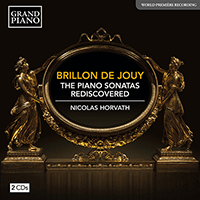
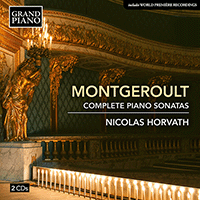
 Grand Piano has gained a reputation for producing high quality recordings of rare keyboard gems. Dedicated to the exploration of undiscovered piano repertoire, the label specialises in complete cycles of piano works by many lesser-known composers, whose output might otherwise have remained unknown and unrecorded.
Grand Piano has gained a reputation for producing high quality recordings of rare keyboard gems. Dedicated to the exploration of undiscovered piano repertoire, the label specialises in complete cycles of piano works by many lesser-known composers, whose output might otherwise have remained unknown and unrecorded.






